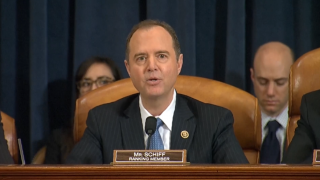by WorldTribune Staff, March 22, 2017
In questioning FBI Director James Comey and NSA chief Mike Rogers, several Democrats on the House Intelligence Committee on March 20 referenced the so-called “Trump dossier” which has been widely dismissed as a subsidized work of fiction.
The dossier by former British spy Christopher Steele suggested the Russians had personal dirt on President Donald Trump.
Famed Watergate investigative reporter Bob Woodward has called the Steele dossier “garbage.”

Democrats are attempting to prove collusion between the Trump campaign and Russian intelligence, which is credited with hacking into Democratic Party emails which critics say were not secured.
Steele’s tainted dossier, however, seems to be the Democrats’ “best public evidence,” Rowan Scarborough wrote for The Washington Times on March 21.
“They have embraced Mr. Steele’s research, which makes the case for collusion even though it has been discredited by the press, its subjects and former intelligence officials.”
Former Director of National Intelligence James Clapper had said the dossier “was not included as part of our report because much of it could not be corroborated,” referring to a time President-elect Donald Trump received an intelligence briefing. “And, importantly, some of the sources that Mr. Steele drew on, the second- and third-order assets, we could not validate or corroborate.”
Former CIA Deputy Director Michael Morell, a Hillary Clinton adviser, said he discovered that Steele had paid his Russian sources and talked to them only through intermediaries, NBC News reported.
“On the question of the Trump campaign conspiring with the Russians here, there is smoke but there is no fire, at all,” Morell said. “There’s no little campfire, there’s no little candle, there’s no spark. And there’s a lot of people looking for it.”
That didn’t stop House Democrats from quoting the dossier’s contents as fact on March 20.
Rep. Andre Carson of Indiana: “In fact, the dossier written by former MI6 agent Christopher Steele alleges that Trump agreed to sideline Russian intervention in Ukraine as a campaign issue, which is effectively a priority for [Russian President] Vladimir Putin. There’s a lot in the dossier that is yet to be proven, but increasingly as we’ll hear throughout the day, allegations are checking out. And this one seems to be as accurate as they come.”
Rep. Joaquin Castro of Texas: “I want to take a moment to turn to the Christopher Steele dossier, which was first mentioned in the media just before the election and published in full by media outlets in January. My focus today is to explore how many claims within Steele’s dossier are looking more and more likely, as though they are accurate.
“This is not someone who doesn’t know how to run a source and not someone without contacts. The allegations it raises about President Trump’s campaign aides’ connections to Russians, when overlaid with known established facts and timelines from the 2016 campaign, are very revealing,” he said.
Castro has called for impeaching Trump over his temporary travel ban executive order.
When Rogers said it is possible the Kremlin would trade favors for intelligence from foreigners, Castro responded, “OK. Well, the dossier definitely seems right on these points. A quid pro quo relationship seems to exist between the Trump campaign and Putin’s Russia.”
Neither Comey nor Rogers testified about any quid pro quo.
California Democratic Reps. Jackie Speier and Adam Schiff also cited the dossier.
People mentioned in the discredited dossier bitterly dismiss it as complete fiction and several say they have been damaged.
In the dossier, Steele says Trump attorney Michael D. Cohen met in Prague with members of Russian intelligence.
“Cohen said he was in Los Angeles at the time and showed his passport to Trump to prove he had never visited Prague. Cohen said everything about him in the dossier is false,” Scarborough’s report said.
Steele also said Russia’s hacking of the Democratic National Committee was conducted by the technology company XBT, run by Russian entrepreneur Aleksej Gubarev.
Mr. Gubarev has sued Buzzfeed, which posted the dossier online, and Steele, saying the charges are outrageous and greatly damaged his businesses.
“Then there is Carter Page, a Naval Academy graduate who worked in Moscow for Merrill Lynch and now runs the investment firm Global Energy Capital in New York,” Scarborough’s report said.
“Like many American businessmen, Mr. Page has ties to Russian scholars and energy executives. His relationship with the Trump campaign was always unclear. He seems to have been a nominal adviser when the campaign was building up a staff, but they parted ways as anything Russia-related began to tar the Trump campaign.”
Page told CNN’s Anderson Cooper: “I’m constantly being attacked [because of the Steele] fake intel report. Everything about me is completely false and so inaccurate.”
In an attempt to prop up the discredited dossier, Rep. Schiff on March 20 recounted the Steele’s telling of a supposed meeting between Page and a Russian oligarch.
The dossier said Page met with Igor Sechin, president of the state-owned Rosneft gas and oil company and said Sechin offered Page a brokerage fee for a plan to sell a 19 percent stake of Rosneft to private investors. Steele wrote that Page was then to persuade Trump to lift U.S. sanctions on Russia.
At the March 20 hearing, Schiff embraced the dossier’s retelling as proof of Steele’s reliability.
“Is it a coincidence that the Russian gas company, Rosneft, sold a 19 percent share after former British intelligence officer Steele was told by Russian sources that Carter Page was offered fees on a deal of just that size?” said Schiff.
With his “just that size,” the congressman “was implying that Steele had inside knowledge that proved uncannily accurate months before Russia sold a 19.5 percent stake in Rosneft,” Scarborough’s report said.
But Steele did not have inside knowledge. In July, Russian First Deputy Prime Minister Igor Shuvalov announced that “the Kremlin will move on to the sale of 19.5 percent of the equity in Rosneft,” the energy publication Newsbase.com reported.
